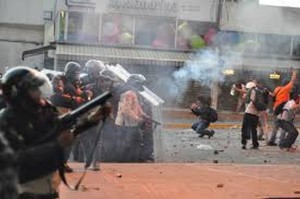Prudent stewardship of government-managed riots, hunger, and general unrest has the potential to make up for lost oil revenue.
 Caracas, May 15 – As the economy worsens and the prospect of forcible government action to forestall the closure of factories becomes more likely, President Nicolas Maduro, wary of leaving the risks to the vagaries of the free market, is considering the radical step of nationalizing violence and poverty.
Caracas, May 15 – As the economy worsens and the prospect of forcible government action to forestall the closure of factories becomes more likely, President Nicolas Maduro, wary of leaving the risks to the vagaries of the free market, is considering the radical step of nationalizing violence and poverty.
Shortages and the closure of unprofitable enterprises have buffeted the socialist country’s ailing economy, not so long ago the darling of the international media for the way it had made the economic philosophy work. Under Maduro and his firebrand predecessor, the late Hugo Chavez, Venezuela cultivated an alternative to the Western model of capitalism, in the process also courting anti-Western allies such as Cuba, Iran, and the Palestinians. Now, however, the model appears to have exhausted its sustainability, which heretofore relied on now-collapsed crude oil prices, raising fears of chaos as people take to the streets to protest their dire straits – a prospect that Maduro seeks to prevent by making rioting and political violence the sole province of the government.
Experts are divided on the wisdom of the move. “Maduro should have done this a year ago, when the indicators began pointing downward,” argued New York Times columnist Paul Krugman. “At this point, nationalizing those institutions may cause more harm than good. Now would be a good time to let the violence and deprivation run its own course instead of propping it up in what will undoubtedly be an inefficient, painful, and drawn-out process with uncertain results.”
Others contend Maduro waited for the perfect moment. “A solid demonstration of the central government’s ability to manufacture, manage, and sustain violence and poverty might be exactly what Venezuela’s system needs to restore investor and civic confidence in the economy,” said Hillel Gershuni, who writes about economic affairs for the journal Mida. “Prudent stewardship of government-managed riots, hunger, and general unrest has the potential to make up for lost oil revenue.”
At risk is Venezuela’s reputation as a worker’s paradise that can confidently thumb its nose at the United States and American allies. If the country plunges into depression and squalor independent of the government’s efforts to centralize that process, Maduro’s stature as an ally for Russia, Iran, and other regimes vying for regional and global influence will wane, and Venezuela’s status as a leader in socialist wonders will be tarnished.
“It would be unfortunate for socialism in general if Venezuela were to demonstrate that the government isn’t actually necessary for this devolution to take place,” explained Gershuni. “So Maduro has a serious, difficult task ahead of him.”
Please support our work through Patreon.




